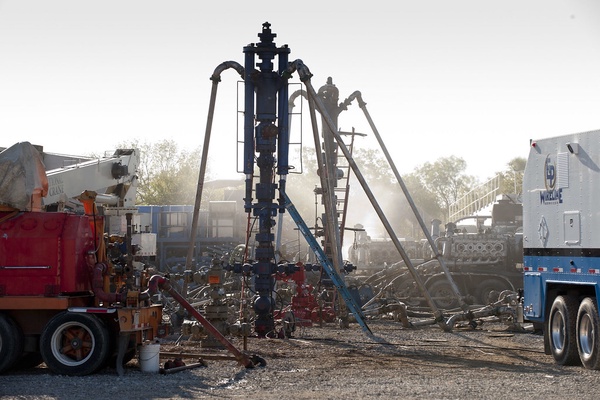The Faults of Fracking
After the Texas power outages, the U.S. is reminded of the effects of fracking

Photo from Creative Commons
As I’m writing this, millions of Americans have lost their access to clean water, food, electricity and heating as an unprecedented and historic snowstorm rampages through the South. In Harris County, Texas, a woman and her child died from carbon monoxide poisoning as they tried to warm themselves with their car. For another Texas family, it was 12 degrees in their mobile home as a mother put her 11-year-old Cristian to bed. He never woke up. I’m tired of politicians sitting idly by and allowing for our environment to be destroyed in the name of pragmatism.
Every day that fracking is allowed to run unchecked is another day lost in the effort to reverse climate change. It’s time to be bold and reject the unsustainable practices that politicians have deemed irreplaceable, and that includes fracking. No amount of profit is worth the environmental wreckage caused by the harmful practice.
This is just one instance on the long list of evidence that climate change is here, and it is deadly. When the crisis is this pressingly urgent, every step towards reversal is important and nothing is insignificant. If we truly want to reverse climate change, we must move away from unsustainable practices, and fracking is no exception. We are the first generation to truly witness climate change, but we are going to be the last generation with the chance to do anything about it. I acknowledge that fracking holds an important part in our economy, but if we don’t make substantial change to reverse climate change, the economy will become the least of our worries.
Fracking may be better than some other forms of natural resource extraction, but it still has its own share of negative environmental impacts. According to Environment America, fracking causes water contamination, air pollution (which leads to higher healthcare costs), habitat destruction and significant methane emissions. Being less harmful than traditional oil drilling does not make fracking a harmless practice.
Many people will acknowledge that fracking is environmentally harmful, but argue that it can’t be banned because our economy relies on it. However, fracking is not a necessary evil, and it is replaceable. According to the World Resources Institute, solar and wind energy is far more sustainable, provides jobs, and supplies sufficient power.
Giving up on climate change reversal for the sake of the job market is counterproductive; income is irrelevant if Earth is uninhabitable. Analyzing the relationship between carbon and the economy, Oxfam found the top 1% richest people in the world’s carbon emissions add up to more than double the emissions of the poorest half of humanity. This begs the question: Is fracking highly protected by politicians because it is absolutely irreplaceable for average Americans and their wellbeing, or is it treated as legendary and essential because the corporations profiting off of it pour their bank accounts into the campaigns of politicians?
The notion that a fracking ban and a low unemployment rate are mutually exclusive is unfounded. It is simply a ploy devised by billionaires to protect the practices that make them money while recklessly exploiting the environment. According to Forbes, the clean energy job market is booming, which would allow for employees relying on fracking to transition to jobs that would benefit the environment and provide a stable income. If clean energy jobs are a viable economic substitute for fracking jobs, then there is no reason for politicians to be so keen on protecting the practice, unless they regard the interests of billionaires to be more important than the wellbeing of our environment.
Of course, transforming the economy is easier said than done, but shouldn’t we at least try to do something about our unsustainable practices? The economy may fluctuate, and there will be bumps in the road, but according to the Environmental Defense Fund, the clean energy industry expansion will be very stimulating for the economy, creating millions of new jobs, and the initial turbulence will be worth it once the industry is dominant and widespread. Even though the transition to clean energy will be difficult, the initial negative effect a fracking ban could have on the economy is incomparable to the effect unchecked unsustainable practices will have on the climate in the coming years.
Yes, it is scary to transform our economy, but climate change will soon prove to be much scarier if we don’t do anything about it. In 50 years, are we going to tell our grandchildren that the reason their Earth is destroyed is because oil drilling made a lot of money back in the day, or are we going to tell them that the reason they can play outside safely is because we were brave enough to dismantle the elite corporations profiting off climate destruction?



